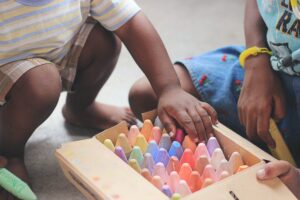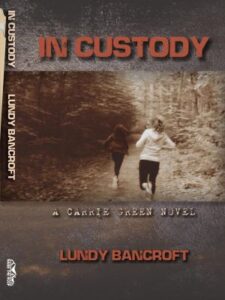Several weeks ago, I wrote a post about kids who see through the abuser. To my surprise, it was the most popular piece I’d put up in a long time; a lot of my readers are trying to see through kids’ eyes. How do young people form their understandings of what is happening when their father (or step-father) abuses their mother? And how can they learn to see through the abuser’s lies and manipulations?
In the discussion that grew out of that post, many mothers shared their stories of children who weren’t seeing through the abuser. Unfortunately, that experience is a common one also. I’m going to examine some of the reasons in this post, which will be in two parts.
(In order to keep my language as simple as possible, I’m going to refer to the abuse perpetrator as a “batterer,” even if his abuse is almost entirely about emotional battering rather than physical or sexual violence. I’m using this term because I’m discussing homes where the primary source of trauma to the kids is Dad’s abuse of Mom, not either parent’s abuse of them directly — which is a different subject.)

1) The pursuit of safety
Kids who grow up around domestic abuse are afraid. The primary thing they live in dread of is the next time that their father will verbally rip Mom to shreds. They hate watching that happen; people who haven’t lived it tend to underestimate how awful these incidents are for kids. For most kids living with a batterer, the number one source of their trauma is this accumulation of acts of psychological cruelty towards their mothers that they’ve had to witness. It eats them up inside to watch Mom sent into misery and robbed of her dignity over and over again.
But they’re scared about other things too, mostly emotional dangers. They’re scared that Dad is going to rip into them directly, or into one of their siblings. They’re scared that he’s going to ruin mealtimes, ruin birthdays, ruin Christmases and other key holidays. They’re scared that he’s going to punish them by taking key freedoms away, causing them to miss out on things they really wanted to be part of. (And a large proportion of batterers punish the whole family when they’re mad at Mom, or when they’re mad at one of the kids. So everyone knows they could pay a big price when he explodes, regardless of which family member he’s actually upset with.)
If he becomes physically frightening at times – as most domestic abusers do – then the kids have all of that additional fear. And as with his cruelty and verbal abuse, the kids usally worry about Mom most of all, since she’s his favorite target. But they worry about all of it.
So kids are scrambling internally, desperate for emotional – and sometimes physical or sexual – safety. And there’s no safe place to stand, so they tend to keep trying different positions over the years, hoping to find a good one.

Position 1: Side with Mom
There are two key advantages on this side. First, you have the emotional benefits of feeling closer to Mom, and in a home where Dad is a batterer she’s your key hope for nurturing and genuine comfort. (As opposed to the self-serving, manipulative form of comfort that comes from the abuser).
Second, you feel better because you know you’re doing the right thing. Kids care a lot about right and wrong, and about fair and unfair, from a very young age. Standing against injustice matters to them. On a deep level, kids feel better about themselves if they stand with Mom.
But there are also costs. The abuser stops giving you much attention when he perceives your bond with Mom, and may be target you for outright insults and other mistreatment. It hurts to be on the outs with him, especially because he’s the one with the power. (Abuse creates a huge power imbalance in the abuser’s favor.) He’s the one who determines who gets which freedoms and privileges; he can make your day go well or terribly. Plus he may shame you about being close to Mom, and if you’re a boy he may call you a Mama’s Boy.
If any of your siblings are allied with the abuser, they start to look down on you. You’re a Loser, siding with Mom; Dad is the cool and powerful one, Winners side with him.
Position 2: Side with the abuser
So at some point you’re likely to try standing here. Now you’re linked to power, which feels good; that’s why kids try to be accepted by the Cool Crowd at school. Some concrete things are likely to go better, because Dad isn’t targeting you. More freedom, more privileges. You’re feeling less afraid for yourself (though you may still worry about Mom or your siblings); if Dad gets scary or violent, you know it’s not likely to be directed at you.
And on a superficial (and therefore addictive) level, you’re feeling good about yourself. You’re a Winner now. And that burning pain of witnessing injustice starts to ease up, because when you’re on Dad’s team you get to decide that Mom deserves what she gets. What a relief.
But there are also losses. You miss feeling closer to Mom, and you long for her nurturing and affection. She hasn’t necessarily withdrawn those things from you – she’s much less likely than the abuser to reject you for being on the wrong team. But you’ve done the withdrawing yourself, because you can’t be in good with the abuser if he sees that you’re still deeply connected to Mom.
Plus, there’s a problem brewing with that superficial feeling of being on the Cool Team; on a deeper level, perhaps unconscious but rumbling somewhere down inside, you know you’re on the side that’s mean and selfish. You know that this side is wrong, that’s it’s unjust. And you’re beginning to hate yourself for being on the wrong side.

Position 3: Stand in the middle
Because both of the positions above come with high prices, at some point you’re likely to try seeing if you can be on both sides’ good list. You’ll remain close to Mom, but try hard simultaneously to win Dad’s approval. You butter him up, cater to him, and see if you can craft yourself into the kind of person he seems to like. When he’s getting nasty, you try to get Mom to give into his bullying, because that will keep the peace. You see if you can mediate their conflicts, see if you can be a third adult in the house. You’ll try to sneak in your cuddly times with Mom when the abuser isn’t around or isn’t noticing.
And for periods of time this may appear to work fairly well.
But here, too, there are serious problems. The stress is overwhelming; your insides are likely to be twisted with anxiety. You’re trying to stay aware of both parents’ moods and desires, anticipate problems before they arise, and watch out for your siblings’ well-being as well; the way to keep the peace is to keep everybody happy. That’s an overwhelming load. Your childhood is disappearing into trying to parent the whole family.
Plus, the abuser isn’t always satisfied with the way you’re catering to him; there are times when he requires your outright loyalty and demands that you participate in rejecting and demeaning Mom. (He won’t say these things aloud, but he’ll make it painfully clear what you have to do to avoid being put back on the bad list.)
As you can see, there’s no great place to be. Kids who witness abuse try out all three of these positions, and stay in them for varying lengths of time as they experience the advantages and the wounds of the spot they’re occupying.

2) Trying to escape the pain of how wrong it all is
I referred to this above, but I want to go into more detail. Adults in general, including people in the helping professions, tend to greatly underestimate how deeply children feel the pain of injustice. There is a highly mistaken — but widely held — belief that children are self-focused, and therefore they experience the world primarily in terms of how things affect them personally. This view leads to the erasure of huge portions of children’s inner experience, including some of their deepest pain. Kids hate seeing people suffer (and hate seeing other animals suffer). Their hearts, in the emotional sense, are no smaller than adult hearts. And kids get super upset when they perceive unfairness happening to anyone, not just to them personally. And if that cruelty or injustice is happening to someone they love, it eats them up inside.
What’s more, children experience their mothers almost as extensions of themselves. So when she is being treated wrongly, they feel that pain both as a wrong to her and as a wrong directly to them. It hurts them double.
In this context of severe distress, it becomes potently tempting to kids to decide that Mom is largely, or even primarily, at fault for what’s being done to her. If they choose to see it that way, they can relieve some of that intense pain, because if she deserves it then it isn’t injustice.
And the abuser never stops reminding them – without saying it directly, of course, but he always has ways to get his messages across – that this escape path is open to them. His unspoken message is, Look at me, I don’t feel your mother’s pain, so you don’t need to either. Just join me and you’ll be away from all that.
This relief comes on top of all the other benefits of siding with the abuser.
So notice this striking point: one of the main reasons why kids side with the abuser is because they’re in so much pain about what he has done. This appears contradictory on the surface, but when you use your imagination to put yourself in the child’s position, it starts to make sense. And it helps to explain why some kids who have been allied with Mom for years will abruptly – and heartbreakingly – pop over to the dark side, a topic I’ll come back to.
In Part 2 of this post I’ll look at several other reasons why kids can end up on the abuser’s team. And we’ll look at ways to help them find their way back to Mom.
Photo by Ernest Brillo on Unsplash (teens lined up)
Photo by Chayene Rafaela on Unsplash (girl holding little brother)
Photo by Austin Pacheco on Unsplash (boys making faces)
Photo by Nick Nice on Unsplash (teen in hoodie)
Photo by Patty Brito on Unsplash (brother and sister)
Photo by Tina Floersch on Unsplash (kids with chalk)

Lundy’s new suspense novel, In Custody, takes on the anti-mother bias and corruption driving the family courts today. A young journalist sets out to investigate the disappearance of a mother and her daughter, and she stumbles into a dark world of intimidation, profiteering, and legal abuse — and finds herself in danger.





Wow. This was spot on with my family. I took the first position, my little sister took the second, and my older brother the third. Even as adults we are all standing in those same positions. It has caused a huge rift in the family and I no longer have a relationship with my parents or my younger sister because I can no longer stand by and helplessly watch the abuse and I didn’t want my kids exposed to it. My brother is an anxiety ridden mess but is finally taking steps to work through it. Thank you for putting this into words and helping to bring understanding.
Thank you so much for sharing your personal and family experience. I’m glad it resonated.
This is my family right now. My 12yr old sided with her father haven’t seen her in a year or even talked to her. My younger tow fall into the this My son dont know what to do and my baby she crys for me to come home because she hates it there without me. But the worst is he hurt us all so bad and is still hurting them.
🥺😓I’m so very sorry ..
Will keep y’all in my prayers
🥺😓
What if its your mom (your kids grandmother) that u live a mile away from..& EVERYONE in your family thinks YOUR THE BAD guy… I need to write a book. This article is SPOT ON
This resonated with me on so many levels. From my own personal experience but also watching situation with close family member. To finally have someone put into words the internal struggle that a child goes through when dealing with domestic abuse and how those different patterns of attachment to both parents can be in the same child at the same time….Thankyou for your words, just wish some counsellors and the family court system would read and understand.
As a child and now a mother who has escaped an abusive relationship, the post about “why children stand by the abuser” is spot on in every sense.
As a child, I stood in different positions but my heart always cared about what was right/just. There’s always a consequence when living in a abusive/dysfunctional home, that’s why it’s important to leave when you know it cannot be repaired. You leave for your children, so they can live in freedom and peace, so they can have a healthy childhood. There may be ups and downs but at least your home is your sanctuary, you & your children will thrive.
Having a deep feeling of justice has carried through to my adulthood & I have learnt that justice & fairness is a constant battle, but we must continue to fight for a better life, a better world.
To break the cycle, to leave a mark, a path for children to follow, away from abuse.
Xx
How does this tie in to parental alienation?
As a mother who has experienced my children, now young adults, go through all 3 positions, I have come to appreciate that my inability to protect them was a failure – and that their decision to ally with their father/my abuser is another trauma I have to heal from. The hurt that abusers do and the harm they cause does not seem to have an end. Thank you for this article, which not only articulates my experience, but also signals that I am not alone and that my sorrow for what my children has endured is well founded. Because I wrestle with constant fear that they will sever ties with me completely – despite having objectively okay to good relationships, their father’s promise to ensure that they hate me as much as he does, and the fact that he nearly got them to that point some years back – hope that you follow with strategies for rebuilding relationships between all of us, mothers and children, who are survivors.
What can be done? I am living this nightmare. The court do not do anything about this. Even attorney’s are not skilled in litigating this. I’m losing my children and it is so painful.
Sixty-seven years old and forty-two years into marriage to a Covert Narcissist and finally someone that understands what happens to kids and later victims of a Narcissist partner. I am so sad that phycologist in practice do not understand this problem. Why are they not being taught this in college? I have a 12th grade education and understand the problem and reading this honestly breaks my heart. I will get past this and have accepted my life was stolen from me by a violent abusive alcoholic and later by a victim of similar abuse. Will there ever be laws to protect children and women I wonder.
Thank you for this – very helpful. Any idea when we can expect to see Part Two?
Interested in part 2 also
Thank you for this! Thank you for bringing your knowledge forth and putting into words many of us can not. My children are going through this and this post helped me understand so much! I wish every judge had the knowledge you do on this abuse. I’ve said it so many times in the last three years, ‘I’m losing my babies’, by that I mean I’m losing them psychologically, they come home not the same. Our precious, close bond I thought not even he could break I’m now watching be torn down. My fear is, and I write this with tears streaming down my face, how many times do I have to tell someone ‘I’m losing my children’ until I’ve lost them for good. The stress is eating my oldest alive, while my youngest is just there. I appreciate your books, your blogs, and putting your knowledge out there. I pray people read and understand and ultimately help our children suffering from this.
Lundy!
Thank you for putting this into words!
My ex made sure that my kids have nothing to do with me. Most certain that my children would have wanted to be with me. Even when the child turns of age the young adult is so brainwashed and scared of what he might say if the child reaches out to me. If my ex/ kids father is out of the picture do the kids come back or should I just not hope anymore?
PEACE LUNDY!!!!
Cyd from Iowa
Excellent article and so close to home… Can you get family court to see this please so we can get our children back?
Oh my gosh, thank you so much for being so insightful and for verbalizing what we can’t
It is amazing how in-tune you are with what victims of abuse experience and the subtle nuances in our emotions. Thank you so much for all that you to to educate and help us!
This article came at just the right time since my children’s father is doing his best to alienate them from me. They are always angry around me and I know it’s due to what he is feeding their souls. Thank you again and I can’t wait to read part 2 of this. I have read your amazing books and you are such a champion for those of us dealing with abuse so thank you from the bottom of my heart and may God continue to bless you and work through you.
I tended to side with my abusive father for safety’s sake as a child. But I blamed myself more than either my mother or father, because my deeply religious mother was 6 months pregnant with me when they got married- I realized at a young age that my birth three months after their wedding meant that my conception was a large part of why they got married. That made me feel like if I hadn’t been born maybe my mom and half-siblings wouldn’t be getting beaten.
This makes so much sense. Wow. I started with part 2 and it is spot on.
I recently found your posts. Thank you for writing this. This was very helpful and I was eager to read the third post for some insight on how to deal delicately with this. I appreciate the advice about patiently waiting for their return, etc, but what I’m still struggling with is the daily discipline. With all the pain of witnessing the abuse their whole life, comes some rebellious decisions.
They are still in my home half the time. In my case we are in the midst of divorce so they live with him half the time and me half the time.
How do I deal with discipline? (14 and 18 boys) For the past 15 years they have watched him undermine every parental decision I made and heard him say many things along with “you don’t have to listen to mom, she is acting outside of my authority” “your mother is the worst person I could have ever married. Don’t marry someone like her”. He covertly and overtly alienated them from me.
He has no rules, boundaries or discipline in his house. So every moment of correction, guidance, follow up on homework, discipline, and even breathing in my house is met with hatred and disrespect from the 14 year and daily threats that he just wants to live with dad.
I hope you might be able to address the balance of giving them time they need and still parenting them with the boundaries and disciplines they desperately need. Thank you so much!